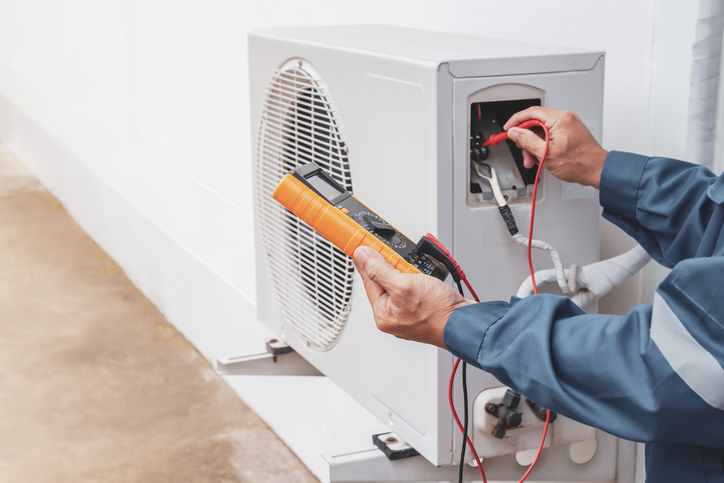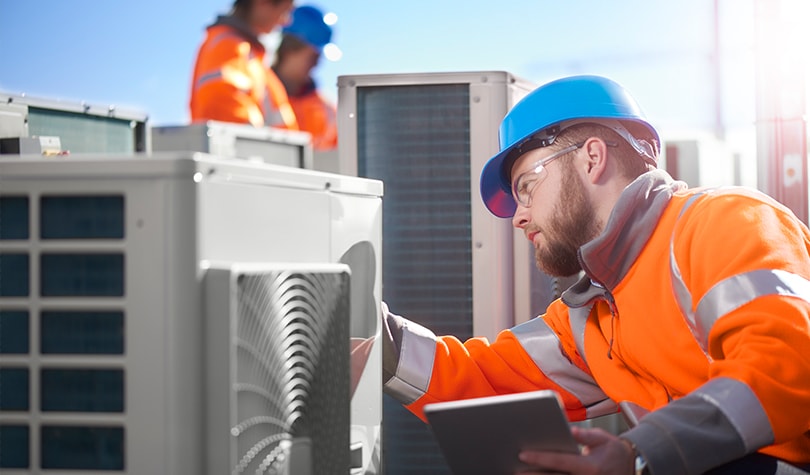Why working with an AC repairman can improve indoor comfort
Wiki Article
All Concerning A/c: Identifying Common Issues and Effective A/c Repair Work Approaches
Cooling and heating systems are critical for preserving interior convenience. Recognizing their components and functionality is essential for determining common concerns. Homeowners often face problems such as ineffective air conditioning, strange smells, or rising energy prices. These indications can suggest underlying concerns that may call for attention. Discovering DIY troubleshooting strategies can be useful, however recognizing when to seek professional aid is similarly important. What steps can be taken to assure long-lasting performance?Comprehending Your HVAC System: Elements and Functionality
A HVAC system, usually taken into consideration the foundation of indoor environment control, contains a number of essential elements that function together to manage temperature and air high quality. The main components consist of the home heating unit, ventilation system, and a/c unit. The heating unit, usually a furnace or boiler, produces heat throughout chillier months, while the a/c system cools down interior rooms throughout the summer.
Typical A/c Problems Home Owners Experience
Property owners typically deal with a number of common heating and cooling troubles, including irregular temperature level circulation throughout their living rooms. In addition, uncommon sounds throughout procedure can show underlying issues that call for focus. Addressing these problems quickly is necessary for keeping suitable system performance.Inconsistent Temperature Level Distribution
Several homes experience the aggravating issue of inconsistent temperature circulation, where particular areas really feel uncomfortably cozy while others stay too chilly. This issue frequently develops from a selection of aspects, including poor insulation, blocked vents, or an improperly sized cooling and heating system. When ducts are not sufficiently secured or when furniture blocks air flow, some areas may receive inadequate air conditioning. Furthermore, thermostat positioning can greatly impact temperature level policy; a thermostat located in a sunlit location may misstate the total temperature of the house. Routine upkeep, including cleaning filters and making sure ductwork is clear, can assist reduce these inconsistencies. Homeowners might also think about zoning systems to much better control temperatures throughout various locations of the home, advertising an extra comfortable living setting.Unusual Sounds During Procedure
When a cooling and heating system operates, unusual sounds can show underlying concerns that require focus. Homeowners may encounter a range of audios, such as grinding, squealing, or hissing. Grinding sounds frequently signal worn-out bearings or parts, while squealing can suggest loosened belts or parts requiring lubrication. Hissing may indicate a cooling agent leakage, which can compromise the system's performance. In addition, banging sounds could point to loose ductwork or a concern with the blower fan. Each of these noises works as a caution, prompting house owners to check out better. Ignoring these indicators can lead to more considerable troubles and pricey repairs. Routine upkeep and punctual focus to uncommon sounds can boost system longevity and performance, making sure a comfortable living environment.Indicators That Indicate Your A/c Demands Repair Work
Exactly how can one tell if their cooling device needs repair? A number of indicators might show underlying issues needing professional attention. If the Air conditioning stops working to cool down the area properly, it might suggest a refrigerant leak or compressor malfunction. Additionally, an increase in power bills without corresponding use modifications can indicate ineffectiveness in the system. Home owners need to also look out to uncommon scents originating from the device, which can show mold development or electrical problems. Moreover, if the a/c often cycles on and off, it could be an indication of a faulty thermostat or other mechanical troubles. Lastly, the existence of water merging around the unit can suggest a stopped up drainpipe line. Identifying these signs early can save money and time, making sure that the air conditioning system operates efficiently and efficiently.Do It Yourself Troubleshooting Techniques for Heating And Cooling Issues
When dealing with heating and cooling concerns, home owners can employ a number of DIY repairing strategies to identify the trouble. Trick techniques include inspecting thermostat setups, checking air filters, and evaluating water drainage concerns. These actions can help identify common breakdowns prior to looking for professional assistance.Examining Thermostat Settings
What steps should home owners require to ensure their thermostat settings are correct? They ought to confirm the thermostat is established to the preferred temperature and mode, whether home heating or cooling. Checking for a clear display screen and validating the thermostat is not set to "hold" or "trip" mode is important. Home description owners ought to additionally verify that the thermostat is level and set up in an area totally free from drafts, straight sunshine, or various other temperature influences. Additionally, recalibrating the thermostat can help provide accurate readings. If the thermostat operates batteries, replacing them may settle any issues. By systematically assessing these aspects, house owners can typically recognize and remedy thermostat-related problems, promoting ideal a/c system performance.Inspecting Air Filters
Air filters play a necessary role in maintaining perfect cooling and heating performance. They trap dust, allergens, and other bits, guaranteeing tidy air blood circulation. Gradually, filters can become blocked, lowering air flow and performance. To inspect air filters, individuals ought to initially situate the filter, usually discovered in the return duct or near the furnace. As soon as situated, they should evaluate the filter's condition-- if it appears filthy or blemished, it likely needs replacement. Many filters require altering every 1-3 months, relying on usage and ecological elements. Routine inspection and timely substitute of air filters not just enhance air top quality but additionally prolong the lifespan of a/c systems, protecting against possible breakdowns and costly repair services.
Assessing Drainage Issues
Just how can house owners successfully identify and attend to water drainage concerns within their HVAC systems? They must check the condensate drain line for blockages or clogs, which can lead to water buildup. Home owners might make use of a wet/dry vacuum to remove any debris obstructing the line. Next off, inspecting the drainpipe frying pan for corrosion or leaks is crucial, as a harmed frying pan can trigger water to overflow. Routine cleansing of the drainpipe line with a mixture of vinegar and water More Info aids stop future clogs. Additionally, guaranteeing proper incline of the drainpipe line promotes efficient water circulation. If these DIY strategies do not fix the concern, seeking advice from an expert HVAC technician may be needed to stay clear of potential water damages and system failure.When to Call an Expert for Air Conditioning Repair Work

While some a/c issues can be handled via do it yourself methods, there are situations where calling a professional becomes essential. Homeowners must look for experienced aid when they experience consistent troubles, such as poor air conditioning, weird noises, or unusual odors rising from the unit. These signs and symptoms might suggest much deeper issues that need specialized expertise and devices to identify and repair properly.

Preventative Upkeep Tips for Heating And Cooling Durability
Routine preventative upkeep can greatly improve the longevity of a/c systems. Home owners need to schedule yearly inspections by licensed technicians to assess system performance and identify prospective problems. Regularly transforming or cleaning air filters is essential, as this assurances proper airflow and minimizes pressure on the system. Furthermore, inspecting and securing ductwork avoids power loss and enhances overall performance.
It is also advisable to maintain the exterior unit free from particles and greenery, enabling peak air flow and warm exchange. Homeowners ought to evaluate the condensate drain for obstructions to avoid water damage and mold and mildew development. Keeping appropriate thermostat setups and making use of programmable alternatives can enhance power performance. Go Here Documenting upkeep tasks assists track service history and can assist in identifying persisting problems. By adhering to these preventative measures, individuals can make best use of the performance and lifespan of their cooling and heating systems
Frequently Asked Concerns
Exactly how Commonly Should I Replace My Cooling And Heating System Filters?
HVAC system filters should commonly be changed each to three months, relying on use, filter kind, and ecological factors. Normal substitute assists maintain performance and air high quality, ensuring peak system efficiency throughout the year.What Dimension Heating And Cooling System Do I Need for My Home?
To identify the appropriate cooling and heating system size for a home, one have to think about square footage, insulation high quality, and local environment. Consulting an expert can help assure maximum performance and convenience for the certain living area.Exist Eco-Friendly HVAC Options Available?
Yes, eco-friendly a/c alternatives are readily available, including energy-efficient heatpump, solar-powered systems, and geothermal heating. These options reduce energy intake and environmental influence, promoting sustainability while keeping efficient climate control for household and business spaces.Exactly How Can I Enhance My a/c System's Power Effectiveness?
To improve cooling and heating power efficiency, one can consistently keep the system, seal air leakages, install programmable thermostats, make use of energy-efficient filters, and assurance appropriate insulation throughout the home to reduce power usage and improve efficiency.
What Is the Ordinary Life-span of an A/c System?
The average life expectancy of an a/c system commonly ranges from 15 to 25 years, depending upon elements such as upkeep, use, and the top quality of installation. Regular upkeep can considerably prolong its operational longevity.Final thought
In summary, an extensive understanding of HVAC systems empowers property owners to determine typical concerns and address small troubles efficiently. Acknowledging indicators of breakdown, employing DIY fixing techniques, and prioritizing regular maintenance can enhance system performance and performance. Nonetheless, when encountered with complex fixings, enlisting professional assistance is important to assure safety and longevity. By cultivating recognition and proactive treatment, individuals can appreciate a comfortable indoor environment while reducing unforeseen costs linked with HVAC failures.Report this wiki page